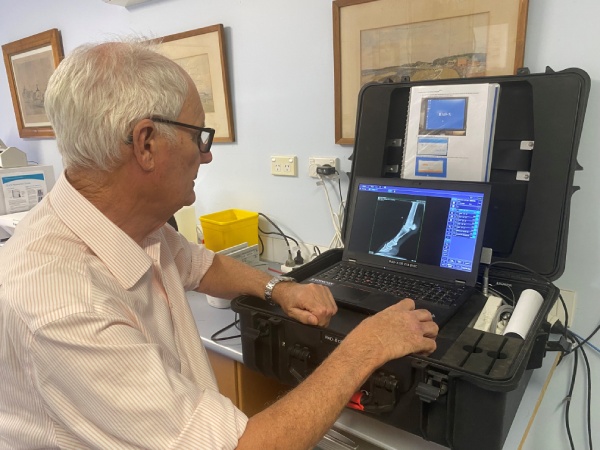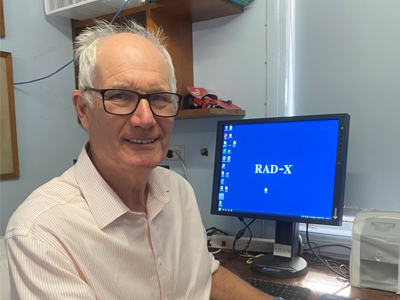This month we’re in Mudgee, NSW. The area’s famed for gourmet food and wine, but the people are also warm and welcoming. That includes our April featured vet, David Parry-Okeden of Church Street Vets, Mudgee.
Here’s what he had to tell us about his career, his life and his thoughts on being a vet.
How Did You Become A Vet?
I always wanted to be a vet. I grew up on Warwick Farm Racecourse in south western Sydney, surrounded by space and all the domestic and farm animals. I recall sitting on the racetrack fence, and watching that inimitable jockey, Billy Cook riding trackwork on Australia’s greatest horse of the time (perhaps of all time), Carioca.
I never thought of doing anything other than working with animals. My only fear was that I might not get the marks to study as a vet, but I was lucky again and I was accepted into university. Thank goodness it was easier in those days!
I graduated from Sydney University in 1968 and headed out to the country to be a rural vet. I’ve been one ever since.
Tell Us About Your Practice
Church Street Vets is a mixed practice, looking after animals small and large in Mudgee and the surrounding area. We have 4 vets, all of us working 3-4 days a week and all with different interests. I personally love the large animals, especially horses, but with a range of vets there’s always someone who can help. There is still a position for another vet to join our practice.
When Did You Start Using Digital X-Ray Equipment In The Practice?
We became interested in digital radiography right at the beginning, in the early 2000s. We could see it being used in the human field and realised the advantages for us. Jim Woods, who’s now part of the Radincon team, was then working at AGFA. We spent a lot of time working with him, adapting human algorithms to images from my son’s ponies – but then we hit a snag. The quality of the images was amazing but the equipment was the size of a very large fridge and there was no way we could truck it over rough country roads to all the farms and studs. It was clear to us that CR was not suitable and that DR was the obvious way to go.
Research into the overseas companies providing digital veterinary equipment led us to California on a field trip. We ended up choosing a system from Eklin (their first export sale), and brought the unit back in our baggage allowance. The hardest part of the whole process was getting it lifted off the conveyer belt at Brisbane Airport – the union rep told us it was too heavy for anyone to lift and we couldn’t have it. It weighed around 30kg, so it was possible to lift, but there were union rules. Luckily, I was able to distract the union rep long enough to lift it myself, and then we were OK to get back to the practice.

With the advent of repository x-rays at horse sales, business took off. We went into partnership with John Crowley and with initially two and later three Eklin-Canon DR machines, we were taking repository x-rays in all states. Dog breeders were impressed with the speed with which we could “develop” their hip score radiographs. Every sick or injured animal was being x-rayed, always with the owner watching. It really helped us grow the practice.
Veterinary imaging has come a long way since those days. The systems we had then wouldn’t cut it today. We’ve upgraded at every opportunity, always with Canon-based systems through Radincon.
What About Your Life Outside Being A Vet?
It’s simple and straightforward.
I live with my wife, Lannie in Mudgee. We have three sons who are now all live in Sydney with their families; only 3 hours’ drive to visit. As with any country town the vets soon become part of the local community, with many of the clients and farmers becoming life-long friends. We have owned numerous animals over the years but are now down to one Jack Russell dog. We thought about having a cat, but Jack Russells and cats do not mix.
Each year we aimed to spend some of the winter months travelling outside Australia, with or without the golf clubs and taking the opportunity to see some European and American practices.
Final Question: What Advice Do You Have For Anyone Starting Out As A Vet Nowadays?
A veterinary degree has always opened a vast array of career opportunities and that certainly has not changed. Neither has the enormous satisfaction to be gained in being your own boss and doing what we do in a local community. I would encourage any young veterinarian to aspire to owning their own rural practice.
Veterinary practice has certainly changed in many ways. On balance for the better. Post-graduate education has become much more readily available. This is largely due to the initiative set up by Tom Hungerford in the 1970s. Technical advances in imaging have revolutionised many aspects of rural practice.
We had some student vets visiting Mudgee recently and I quoted them a figure for how much they could expect to earn if they worked hard and ran their own practice. They were amazed and quoted very moderate salaries that they had been told to expect. I further suggested that there were some things they should consider if they aspire to rural practice.
- Join the AVA.
- Get an ABN.
- Get a good accountant.
- Be prepared to work hard.
- Allow for annual holidays, preferably to include taking in the nuances of overseas practices.
- If you find yourself becoming emotionally involved, find another profession.
Thank you David Parry-Okeden for fitting this interview in around vet emergencies and the challenges of rural phone coverage! It was great talking to you and we look forward to catching up in person sometime soon.

